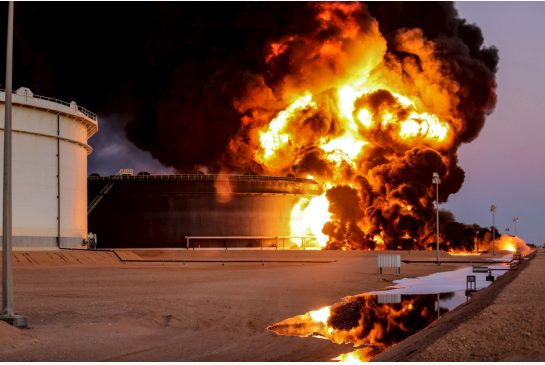Last chance for peace in Libya

The Star
True story: when the panic took hold in Benghazi five years ago as Muammar Qadhafi’s armour bore down toward the epicentre of the fledgling Libyan rebellion, cynicism was quick to follow.
“It’s all because of the oil,” one desperate Libyan hospital administrator told me in fury as the outside world watched the uprising implode without acting. The plea for foreign military aid for the rebel cause was going unanswered. The West’s love of oil would keep Qadhafi in power. The Libyan version of the Arab Spring was about to become a living hell, freezing over.
But then came intervention, under last-minute UN Security Council Resolution 1973. France dropped the first bombs, with a nanosecond to spare. Benghazi was saved. The tide turned. And I hitched a ride back to Egypt for a handover to incoming colleague Rosie Dimanno.
Wandering down to Tahrir Square on that last night in Cairo, I came upon a familiar refrain. A small group of angry protesters seethed with suspicion, wondering what the sudden attack on Qadhafi was really about.
“It’s all because of the oil,” spat one, summing up his anger against the West, in general, but the United States especially. The same refrain, the same blame, assigned to two sets of opposing facts, just a few days apart.
Damned if you do, damned if you don’t, right? Well, sure. Except sometimes it is all about oil — like that time in 1953, when British and American spies engineered a coup d’etat in Iran. Or a century ago, when France and Britain secretly carved up the dying Ottoman Empire under Sykes-Picot. Or today, for that matter, as our governments work to distinguish between the beheaders we hate (ISIS) versus the beheaders we arm (Saudi Arabia).
I happen to believe that wasn’t the case with Libya. In the full blush of those earliest days of the Arab Spring, the impulse from the White House — perhaps even moreso from the U.S. State Department — was about getting on “the right side of history” after decades of empowering regional dictators whose days were clearly numbered.
Barack Obama took an ill-advised early victory lap after Qadhafi fell — his version of George W. Bush’s “Mission Accomplished” moment in Iraq. The regime’s “dark tyranny” was lifted, the president crowed, “without putting a single U.S. service member on the ground.”
True then. And now, also true, the post-Qadhafi has been not so much dark tyranny as a dark comedy of squandered opportunities, with various proxy players, from Egypt to the United Arab Emirates to the U.S. itself leaning on the scales.
A low-grade civil war, involving two rival governments and a cluster of regional militias, has yet to establish order. Deepening chaos has enabled militants loyal to the Islamic State to take root in Qadhafi’s home city, Sirte, and now, dangerously beyond. American attempts to tilt the balance, militarily, culminated late in 2014 with the embarrassing spectre of a planeload of elite soldiers chased away at gunpoint.
That’s the backdrop to Tuesday’s news — a breakthrough, on paper, at least, in the UN-backed Libyan peace process, with the announcement of a new unity government. The list of 32 ministers spans Libya’s fractured political spectrum, drawing in prominent names from its most fractious regions.
One war-weary contact of mine in Tripoli — Waleed Abudhair and I met on the streets during former prime minister Paul Martin’s visit to Libya in 2004 — spoke rare words of encouragement late Tuesday, upon reviewing the government list. Waleed has proven a sharp critic of much of what has transpired since 2011, assigning much — not all — of the blame to foreign meddling.
But on Tuesday, after exchanging congratulatory texts with newly named Foreign Minister Marwan Abusrewil, Abudhair offered a note of unusual hope in an email to the Star, calling the new cabinet minister the sort of man “with the knowledge and the brief to change our messy situation.
“The former regime left a terrible legacy of institutional breakdown and corruption, as you know. We will see,” said Abudhair.
This now is the best chance, perhaps the last chance, for Libya to come out whole and avoid the Afghanistan-like quagmire that so many predict. If it fails, more invention against the Libyan branch of Isis may not be long off.
But in the meantime, the accrued distrust of five meddlesome years — layered upon even deeper distrust of foreign meddling decades in the making — requires that the U.S. and its allies take a step back and allow internal diplomacy to play out.
Libyans know what is at stake better than the rest of us. It’s the right moment to stand aside and provide the breathing space to let them tackle it themselves.
How to submit an Op-Ed: Libyan Express accepts opinion articles on a wide range of topics. Submissions may be sent to oped@libyanexpress.com. Please include ‘Op-Ed’ in the subject line.
- Libyan MP cautions new UN envoy over approach - January 27, 2025
- Oil expert criticises Libya’s public sector hiring freeze - January 27, 2025
- Trump proposes Gaza population transfer plan - January 27, 2025


